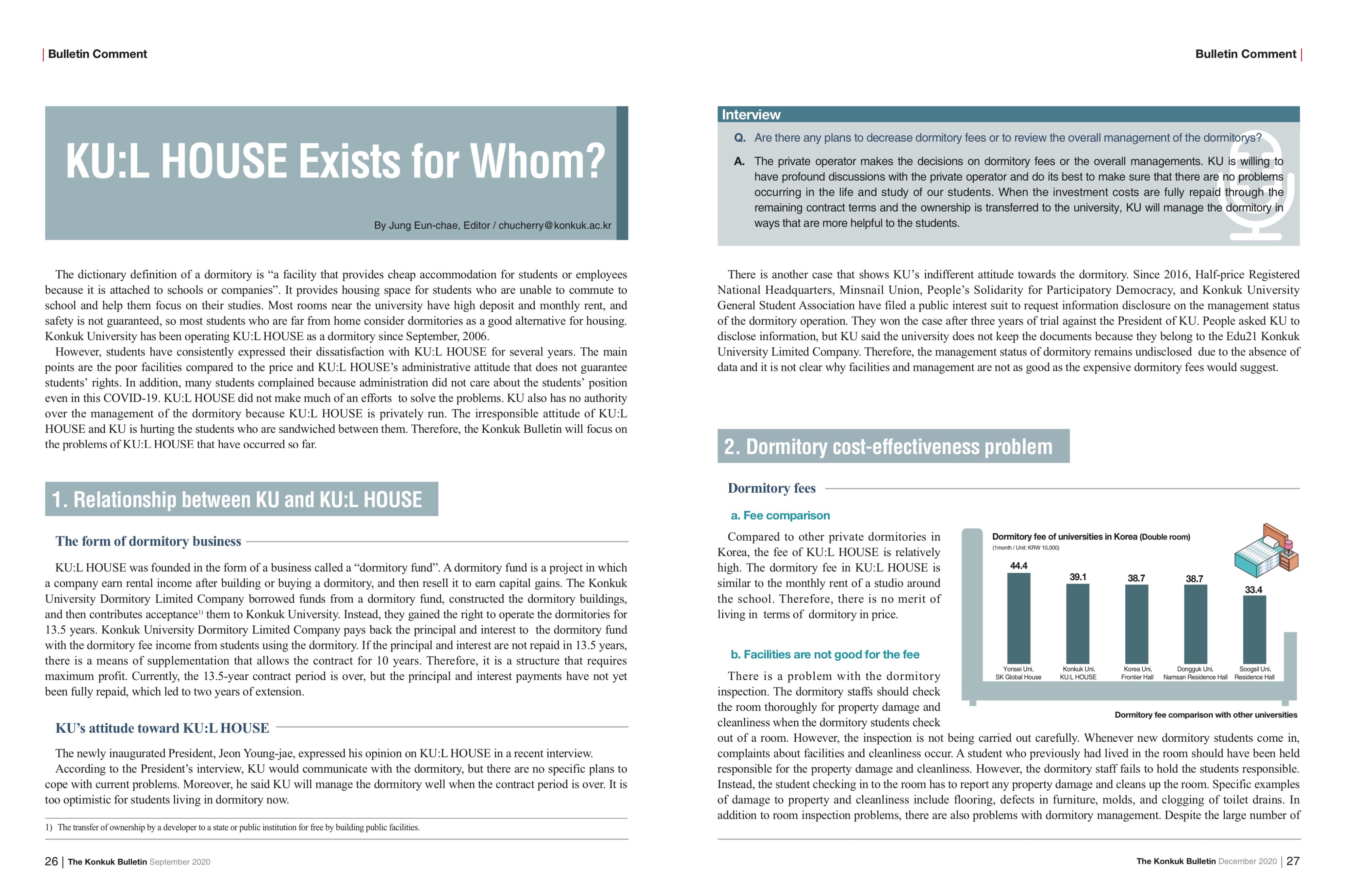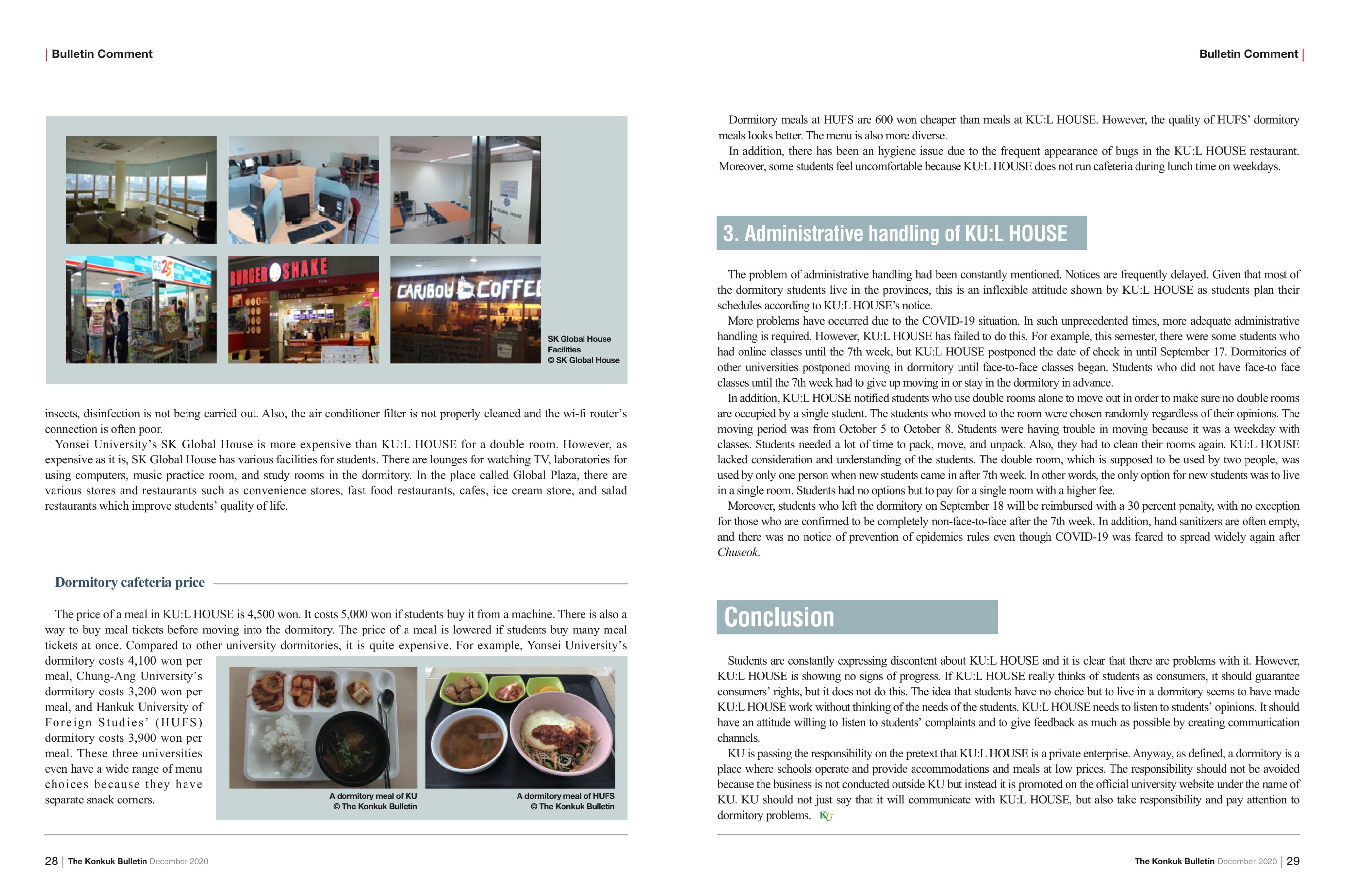
|
The dictionary definition of a dormitory is “a facility that provides cheap accommodation for students or employees because it is attached to schools or companies”. It provides housing space for students who are unable to commute to school and help them focus on their studies. Most rooms near the university have high deposit and monthly rent, and safety is not guaranteed, so most students who are far from home consider dormitories as a good alternative for housing. Konkuk University has been operating KU:L HOUSE as a dormitory since September, 2006.
However, students have consistently expressed their dissatisfaction with KU:L HOUSE for several years. The main points are the poor facilities compared to the price and KU:L HOUSE’s administrative attitude that does not guarantee studentsʼ rights. In addition, many students complained because administration did not care about the studentsʼ position even in this COVID-19. KU:L HOUSE did not make much of an efforts to solve the problems. KU also has no authority over the management of the dormitory because KU:L HOUSE is privately run. The irresponsible attitude of KU:L HOUSE and KU is hurting the students who are sandwiched between them. Therefore, the Konkuk Bulletin will focus on the problems of KU:L HOUSE that have occurred so far.
1. Relationship between KU and KU:L HOUSE
The form of dormitory business
KU:L HOUSE was founded in the form of a business called a “dormitory fund”. A dormitory fund is a project in which a company earn rental income after building or buying a dormitory, and then resell it to earn capital gains. The Konkuk University Dormitory Limited Company borrowed funds from a dormitory fund, constructed the dormitory buildings, and then contributes acceptance1) them to Konkuk University. Instead, they gained the right to operate the dormitories for 13.5 years. Konkuk University Dormitory Limited Company pays back the principal and interest to the dormitory fund with the dormitory fee income from students using the dormitory. If the principal and interest are not repaid in 13.5 years, there is a means of supplementation that allows the contract for 10 years. Therefore, it is a structure that requires maximum profit. Currently, the 13.5-year contract period is over, but the principal and interest payments have not yet been fully repaid, which led to two years of extension.
KU’s attitude toward KU:L HOUSE
The newly inaugurated President, Jeon Young-jae, expressed his opinion on KU:L HOUSE in a recent interview.
According to the President’s interview, KU would communicate with the dormitory, but there are no specific plans to cope with current problems. Moreover, he said KU will manage the dormitory well when the contract period is over. It is too optimistic for students living in dormitory now.
Interview
Q. Are there any plans to decrease dormitory fees or to review the overall management of the dormitorys?
A. The private operator makes the decisions on dormitory fees or the overall managements. KU is willing to have profound discussions with the private operator and do its best to make sure that there are no problems occurring in the life and study of our students. When the investment costs are fully repaid through the remaining contract terms and the ownership is transferred to the university, KU will manage the dormitory in ways that are more helpful to the students.
There is another case that shows KUʼs indifferent attitude towards the dormitory. Since 2016, Half-price Registered National Headquarters, Minsnail Union, People’s Solidarity for Participatory Democracy, and Konkuk University General Student Association have filed a public interest suit to request information disclosure on the management status of the dormitory operation. They won the case after three years of trial against the President of KU. People asked KU to disclose information, but KU said the university does not keep the documents because they belong to the Edu21 Konkuk University Limited Company. Therefore, the management status of dormitory remains undisclosed due to the absence of data and it is not clear why facilities and management are not as good as the expensive dormitory fees would suggest.
2. Dormitory cost-effectiveness problem
Dormitory fees
a. Fee comparison
Compared to other private dormitories in Korea, the fee of KU:L HOUSE is relatively
high. The dormitory fee in KU:L HOUSE is similar to the monthly rent of a studio around
the school. Therefore, there is no merit of living in terms of dormitory in price.
b. Facilities are not good for the fee
There is a problem with the dormitory inspection. The dormitory staffs should check
the room thoroughly for property damage and cleanliness when the dormitory students check out of a room. However, the inspection is not being carried out carefully. Whenever new dormitory students come in, complaints about facilities and cleanliness occur. A student who previously had lived in the room should have been held responsible for the property damage and cleanliness. However, the dormitory staff fails to hold the students responsible. Instead, the student checking in to the room has to report any property damage and cleans up the room. Specific examples of damage to property and cleanliness include flooring, defects in furniture, molds, and clogging of toilet drains. In addition to room inspection problems, there are also problems with dormitory management. Despite the large number of insects, disinfection is not being carried out. Also, the air conditioner filter is not properly cleaned and the wi-fi routerʼs connection is often poor.
Yonsei Universityʼs SK Global House is more expensive than KU:L HOUSE for a double room. However, as expensive as it is, SK Global House has various facilities for students. There are lounges for watching TV, laboratories for using computers, music practice room, and study rooms in the dormitory. In the place called Global Plaza, there are various stores and restaurants such as convenience stores, fast food restaurants, cafes, ice cream store, and salad restaurants which improve studentsʼ quality of life.
Dormitory cafeteria price
The price of a meal in KU:L HOUSE is 4,500 won. It costs 5,000 won if students buy it from a machine. There is also a way to buy meal tickets before moving into the dormitory. The price of a meal is lowered if students buy many meal tickets at once. Compared to other university dormitories, it is quite expensive. For example, Yonsei Universityʼs dormitory costs 4,100 won per meal, Chung-Ang Universityʼs dormitory costs 3,200 won per meal, and Hankuk University of Foreign Studiesʼ (HUFS) dormitory costs 3,900 won per meal. These three universities even have a wide range of menu choices because they have separate snack corners.
Dormitory meals at HUFS are 600 won cheaper than meals at KU:L HOUSE. However, the quality of HUFS’ dormitory meals looks better. The menu is also more diverse.
In addition, there has been an hygiene issue due to the frequent appearance of bugs in the KU:L HOUSE restaurant. Moreover, some students feel uncomfortable because KU:L HOUSE does not run cafeteria during lunch time on weekdays.
3. Administrative handling of KU:L HOUSE
The problem of administrative handling had been constantly mentioned. Notices are frequently delayed. Given that most of the dormitory students live in the provinces, this is an inflexible attitude shown by KU:L HOUSE as students plan their schedules according to KU:L HOUSE’s notice.
More problems have occurred due to the COVID-19 situation. In such unprecedented times, more adequate administrative handling is required. However, KU:L HOUSE has failed to do this. For example, this semester, there were some students who had online classes until the 7th week, but KU:L HOUSE postponed the date of check in until September 17. Dormitories of other universities postponed moving in dormitory until face-to-face classes began. Students who did not have face-to face classes until the 7th week had to give up moving in or stay in the dormitory in advance.
In addition, KU:L HOUSE notified students who use double rooms alone to move out in order to make sure no double rooms are occupied by a single student. The students who moved to the room were chosen randomly regardless of their opinions. The moving period was from October 5 to October 8. Students were having trouble in moving because it was a weekday with classes. Students needed a lot of time to pack, move, and unpack. Also, they had to clean their rooms again. KU:L HOUSE lacked consideration and understanding of the students. The double room, which is supposed to be used by two people, was used by only one person when new students came in after 7th week. In other words, the only option for new students was to live in a single room. Students had no options but to pay for a single room with a higher fee.
Moreover, students who left the dormitory on September 18 will be reimbursed with a 30 percent penalty, with no exception for those who are confirmed to be completely non-face-to-face after the 7th week. In addition, hand sanitizers are often empty, and there was no notice of prevention of epidemics rules even though COVID-19 was feared to spread widely again after Chuseok.
Conclusion
Students are constantly expressing discontent about KU:L HOUSE and it is clear that there are problems with it. However, KU:L HOUSE is showing no signs of progress. If KU:L HOUSE really thinks of students as consumers, it should guarantee consumersʼ rights, but it does not do this. The idea that students have no choice but to live in a dormitory seems to have made KU:L HOUSE work without thinking of the needs of the students. KU:L HOUSE needs to listen to studentsʼ opinions. It should have an attitude willing to listen to studentsʼ complaints and to give feedback as much as possible by creating communication channels.
KU is passing the responsibility on the pretext that KU:L HOUSE is a private enterprise. Anyway, as defined, a dormitory is a place where schools operate and provide accommodations and meals at low prices. The responsibility should not be avoided because the business is not conducted outside KU but instead it is promoted on the official university website under the name of KU. KU should not just say that it will communicate with KU:L HOUSE, but also take responsibility and pay attention to dormitory problems.


